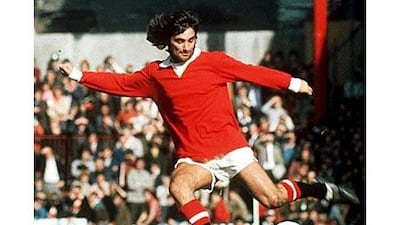"End Of The World" proclaimed the front page of the British tabloid the Daily Mirror, offering those readers who had somehow managed to survive Armageddon video footage via its web site of the precise second that planet Earth as we knew it ceased to exist. Immense was my relief, therefore, when I discovered that I had not snored my way through global destruction; the doom-and-gloom headline was actually in reference to a 34-year-old man who had been admitted to hospital for a routine foot operation following a mishap in Milan. And so began another typical week in the untypical life of David Beckham.
Daily medical bulletins from his Finnish surgeon were released to the global media - I was a tad disappointed not to see them posted on the gates of Buckingham Palace as is the tradition when a member of the Royal Family is poorly - the Poet Laureate was moved to pen an ode and "a friend" revealed in another tabloid, The Sun: "He thinks he is being punished for something he must have done wrong in life, which is ridiculous."
Ridiculous is the word; of course, it is a shame Beckham has been denied the chance to become the first English player to appear in four World Cup finals, but those who have used words such as tragedy to describe his absence in South Africa should think again. As the end of his football career draws closer, he has the consolation of having played in three previous World Cup tournaments - without making a mark on any occasion - whereas any number of far, far greater talents never had the opportunity to play in one.
Beckham's former Manchester United teammate, Ryan Giggs, for one. The most successful player in English club football history, Giggs has only heard tales of the one time Wales qualified for a World Cup, in 1958 in Sweden. Over the years, a myth has grown that Giggs could have adopted the Three Lions had he so chosen because, having been educated on the outskirts of Manchester, he was capped by England Schoolboys. In fact, the only other nation he could have represented was Sierra Leone courtesy of his paternal grandfather.
The late Jim Baxter, British Prime Minister Gordon Brown's hero when he stood on the terraces of Starks Park cheering Raith Rovers and regarded by many as the greatest Scottish player of all time, was another to have been thwarted in his desire to perform on football's greatest stage. The closest Slim Jim came to appearing in a World Cup was in 1962 when Scotland had to meet Czechoslovakia in a play-off to qualify for the finals in Chile.
As Denis Law recalls of that shoot-out in Brussels: "We lost half a team through injury leading up to the game which was played in the Heysel Stadium. Even so, we were leading 2-1 with eight minutes remaining. What can I tell you? Scotland being Scotland we lost 4-2 in extra-time. Czechoslovakia were a wonderful team bristling with great players like Masopust, Pluskal and Popluhar, so it was consolation of sorts when they went all the way to the final in Chile before losing 3-1 to Brazil."
If he had not succumbed to his injuries 15 days after the Munich Air Disaster in February, 1958, it is fair to presume Duncan Edwards would have played in the 1958-62-66 and 70 World Cup finals. Among the questions that can never be answered is whether an England XI containing Edwards, Tommy Taylor, Roger Byrne and possibly Mark Jones and David Pegg (all of whom also died in the tragedy) from United's 1956 and 1957 championship-winning teams might have won the 1958 World Cup instead of bowing out in the group stage after a 0-0 draw with eventual winners Brazil? And come 1966 when Edwards would have been only 29, would it have been his hands or those of Bobby Moore that held aloft the Jules Rimet trophy?
It says much about his genius on the pitch that George Best nearly made his World Cup debut in Spain in 1982 while going through the motions for Hong Kong Rangers. Billy Bingham, the Northern Ireland manager, thought long and hard about including Best in his 22-man squad, but after much soul searching came to the conclusion that at the age of 36 and after years of carousing and generally burning the candle at both ends, the Belfast Boy's time had, alas, passed.
There are so many others; Germany's Bernd Schuster ... Ian Rush of Wales ... Liberia's George Weah...Ireland's Liam Brady ... but the greatest player to miss out was unarguably Alfredo Di Stefano. The "Blond Arrow" was thwarted in 1950 and 1954 when Argentina refused to enter the tournament for political reasons and, having moved to Real Madrid and become a nationalised Spaniard, lost out for a third time when his adopted nation were surprisingly knocked-out by Scotland at the qualifying stage. Di Stefano's World Cup sob story was complete in 1962 when after playing in all four of Spain's qualifying games, he missed the finals in Chile with a leg injury.
So shed tears for David Beckham? Don't make me laugh. sports@thenational.ae

